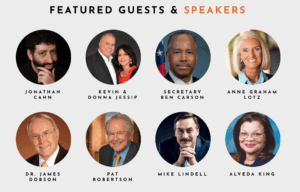It was billed as a worship rally, but it could have been a political rally.
Last Saturday, Sept. 26, nearly 100,000 evangelicals gathered at the National Mall in Washington, D.C., for the stated purpose of worshiping God. They were led by Vice President Mike Pence speaking and by Michael W. Smith in singing. Among the lyrics sung: “It’s your breath in our lungs. So we pour out our praise! Pour out our praise!”
Meanwhile, twice as many people — 204,000 Americans — have died from a disease that inflames the lungs, preventing oxygen from getting to the blood, causing organ failure. The United States has recorded the highest death rate from COVID-19 of any country in the world.
 Yet the overwhelming majority of these evangelical Christian worshipers on the National Mall ignored such basic precautions as wearing masks and socially distancing, following the lead of an administration that has downplayed and misled the public about the global pandemic.
Yet the overwhelming majority of these evangelical Christian worshipers on the National Mall ignored such basic precautions as wearing masks and socially distancing, following the lead of an administration that has downplayed and misled the public about the global pandemic.
The event at the National Mall was organized by The Return and featured evangelical and Republican leaders such as Pence, Ben Carson, Michele Bachmann, Pat Robertson, James Dobson, Anne Graham Lotz, and the “My Pillow” founder, Mike Lindell.
As has been the case over and again in the past year, the worship of God and the worship of a political ideology merged that Saturday. And worship music provided the soundtrack.
Playing with power
This past year has been especially political in the worship world. During President Donald Trump’s impeachment battle in December 2019 — on charges of abuse of power and obstruction of Congress — dozens of well-known worship leaders went to the White House to hold a “worship service,” and to pray for and take photographs with Trump.
These included Kari Jobe, Cody Carnes, Brian and Jenn Johnson, and Hillsong pastor Brian Houston.
Jobe, a Christian singer and recording artist, said: “I’ve just been in tears all day. It’s been incredible. I’m just so thankful to be a part of this today and just see what God’s doing in our White House.”
With a glow on his face, Carnes, an evangelical worship leader, joined in saying: “We’ve gotten to worship. We’ve gotten to pray for the president. And I just have been so encouraged today because there are so many good things happening out of this house. So many good things happening for the faith community and for the world. And things that we all believe in in the faith community that can change the world are being supported, and they’re happening in this house. So we’re just encouraged. And we’ve had just such an amazing time here today.”

Sean Feucht
Sean Feucht, an evangelical singer and activist, said: “We just laid our hands on (Trump) and prayed for him. It was like a real intense, hardcore prayer. It was so wild. I could not believe he invited us in, that he carved out time to meet with us.”
Vice President Mike Pence tweeted: “Wonderful stopping by a worship leaders briefing today at the White House!”
After a failed run for Congress as a Republican, Feucht has spent 2020 traveling around the country organizing more than 20 “riots to revival” which are billed as “worship protests” in communities that have been suffering from police violence. Feucht has joked on stage at these events that they are allowed to do this as long as they label it as a “protest.” Each event features sound systems to amplify their jokes and worship music over the cries of nearby Black Lives Matter protests.
These “worship protests” have attracted thousands of people, breaking local requirements to wear masks and socially distance. The “worship protests” include around two hours of singing, preaching and, of course, an offering. One gathering attracted 5,000 people. And Feucht is planning to continue the “worship protests,” culminating in yet a second massive event at the National Mall in Washington D.C. on Oct. 25.
The political power of praise
In her book, Singing the Congregation, Baylor University professor Monique Ingalls explores how worship events such as these function as both pilgrim gatherings and eschatological communities.
While many American evangelicals may not go on a pilgrimage to the Holy Lands, they will buy a plane ticket to a major city in the United States. As eschatological communities, these events shape a gathering that evangelicals believe merges the worship of heaven envisioned in the book of Revelation with that moment’s worship — reaching across space and time in a way that reshapes the world religiously and politically.
 Philip Wegner, a scholar on religious communities who teaches at the University of Florida, says these events create a “narrative utopia” of an imaginary community that has “material, pedagogical and ultimately political effects, shaping the ways people understand and, as a consequence, act in their worlds.”
Philip Wegner, a scholar on religious communities who teaches at the University of Florida, says these events create a “narrative utopia” of an imaginary community that has “material, pedagogical and ultimately political effects, shaping the ways people understand and, as a consequence, act in their worlds.”
Ingalls details how the Passion Conferences use primarily white American male worship leaders along with white evangelical music culture in a way that promotes “the idea that Christian unity is achieved through assimilation to the cultural — in particular, the musical —norms of white North American evangelical Christianity.”
She tells the story of the 2013 Passion Conference, in which everyone in the overwhelmingly white congregation was given a mask with a photograph of a — usually Black — child trafficking victim from a far distant country who was described as voiceless and powerless. The white worshipers held the Black children’s masks up to their faces and sang “God of Angel Armies.”
Ingalls adds: “Nowhere in the sung lyrics is the singer or community portrayed as a collaborator with God; God is the only active agent, and the singer-believer’s sole action is having faith in God’s sovereign control of all things … . Like the voiceless Others they sing for, worshipers are framed as undeserving, passive, grateful recipients of God’s salvation.” As she left the event, she observed how these children’s masks filled the stadium trash cans.
From the Neo-Calvinist theology of these events, Ingalls concludes that “Passion marries an ostensibly progressive social-justice cause with an essentially conservative, neocolonialist politics … . Passion’s performance seems designed to mask structures of earthly power rather than to make participants aware of their own complicity with them, perpetuating what Teju Cole has called the ‘white savior industrial complex,’ in which marginalized places and peoples serve as ‘a backdrop for white fantasies of conquest and heroism.’”

Jonathan Cahn is a Messianic Christian pastor whose novel “The Harbinger” compares the United States and the Sept. 11 attacks to ancient Israel and the destruction of the Kingdom of Israel. He was an organizer and key figure at the Sept. 26 rally on the National Mall.
At these worship conferences, participants are “never encouraged to question their own countries’ political structures or policies” and “no connection was made between the suburban North American lifestyle and the global economic and political structures that drive trafficking.”
As a result, she concluded: “No sense of responsibility was conveyed; rather, human trafficking was framed largely as voluntary charitable giving by the ‘haves’ to the ‘have nots.’”
After these worship events conclude, the masses of white worshipers return to their communities with the illusion of having met with the worship of heaven, of having done something of political significance, and then they bring those merged religious and political illusions back to their own local worship and government contexts.
We’re the greatest
When you look at the top 100 worship songs of the 2010s, you’ll begin to notice one major theme emerge: Our God is the greatest. Of course, I’m well aware of the Bible verses used to promote this theology. And to be fair, if Jesus is God and did resurrect, then he would technically be greater than other gods that do not even exist.
But what we have in American evangelicalism is a worship culture that says: “Our God is the greatest. Our country is the greatest. So our God is better than your god, and our country is better than yours.”
Then we unite this religious and nationalistic elitism into a massive worship event that features the vice president of the United States and Republican politicians and celebrities leading 100,000 evangelical pilgrims into an illusion of heaven and the end times crossing space and time to meet at the National Mall to promote the re-election of Donald Trump.
 Is anyone concerned about the spirit of elitism here? Does anyone wonder if there is a cult-like delusion going on?
Is anyone concerned about the spirit of elitism here? Does anyone wonder if there is a cult-like delusion going on?
We now have influential megachurches with Fox News contributors as pastors doing “Freedom Sundays,” and having the White House press secretary or even the vice president speaking, with congregations and choirs singing, “Make America Great Again.” And now there’s a new church planting network called the “Patriot Church Movement” which welcomes “disciples of Christ and Patriots.”
We should not be surprised, then, that in the midst of a global pandemic, evangelical Christians schedule two worship gatherings at the National Mall to promote the reelection of Donald Trump, with hundreds of thousands of pilgrims singing about Jesus being the breath in our lungs as hundreds of thousands of their neighbors die by not being able to breathe.
Moving from worship to love
Worship leaders, we have an absolute mess on our hands. And it’s time to face some hard truths. I know this, because I have been where you are.
Worship leaders need to stop going to Washington, D.C., and start going to therapy. Our wounds are deep. We aren’t even aware that they exist, let alone how deep they run. And we need professional help.
On my first night as a student at the 10,000 Fathers Worship School, they told us we needed to have God-awareness and self-awareness. I thought my God-awareness was totally fine. But I never had considered having self-awareness.
When you look at the lyrics of the top 100 worship songs of the 2010s, self-awareness is virtually nowhere to be seen. We have been theologically formed by the Neo-Calvinists to focus so much on the sovereignty of God that we have become invisible at best and usually described with totally negative worship lyrics. It’s no wonder that in 20 years of leading worship, I never had thought about self-awareness. This concept doesn’t exist in our lyrics in any meaningful way.
 The reason we are totally unaware of our neighbors is that we are totally unaware of ourselves. Jesus called us to love our neighbors as ourselves. And unfortunately, we do. We love our neighbors with the same unaware, dismissive attitude that we love ourselves. And just as Sean Feucht is drowning out the cries of Black Lives Matter protestors with the amplified sounds of his “worship protests,” we have drowned out our own pain with the clanging sounds of praise.
The reason we are totally unaware of our neighbors is that we are totally unaware of ourselves. Jesus called us to love our neighbors as ourselves. And unfortunately, we do. We love our neighbors with the same unaware, dismissive attitude that we love ourselves. And just as Sean Feucht is drowning out the cries of Black Lives Matter protestors with the amplified sounds of his “worship protests,” we have drowned out our own pain with the clanging sounds of praise.
We need to stop singing about how our God and country are the greatest, and start listening to our Muslim, Buddhist, Hindu, agnostic, atheist, ex-evangelical, Black, Asian, Native American, Hispanic, and LGBTQ neighbors. We need to learn of their wonders and grieve with them in their wounds. We need to learn to love them with a healthy love that grows from the love we will learn over time and from the healing we need to have ourselves.
Because of how we have used the language and sounds of worship in totally unaware ways to drown out our pain and the cries of the marginalized around us, we need to stop talking about worshiping God and start focusing on loving ourselves in a way that overflows into love for our neighbors.
If we love God, we will love ourselves. If we love ourselves, we will love our neighbors. If we love our neighbors, we will love God.
It’s time to repent of our worship that is severely damaging ourselves, our neighbors and our world, and instead begin to converge in love of self, neighbor and God.
 Rick Pidcock is a stay-at-home father of five kids. He and his wife, Ruth Ellen, have started Provoke Wonder, a collaboration of artists that exists to foster child-like worship through story and song. Provoke Wonder’s first album, Consider the Stars, was released in March 2020. Their first children’s book, What If, will be released in 2020. Rick is pursuing a master of arts degree in worship from Northern Seminary.
Rick Pidcock is a stay-at-home father of five kids. He and his wife, Ruth Ellen, have started Provoke Wonder, a collaboration of artists that exists to foster child-like worship through story and song. Provoke Wonder’s first album, Consider the Stars, was released in March 2020. Their first children’s book, What If, will be released in 2020. Rick is pursuing a master of arts degree in worship from Northern Seminary.


